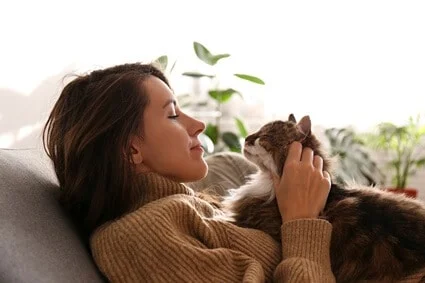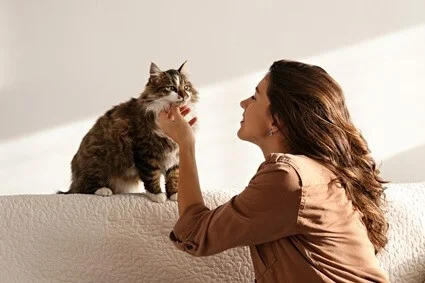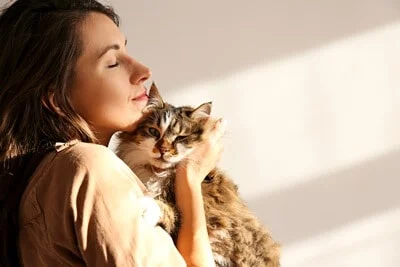Cats have been domesticated for 10,000 years. Because of the shorter domestication period, cats display weaker responses when interacting with humans. Their standoffish demeanor means that whatever attachment a cat develops for its owners is often called into question. People often wonder if cats will miss their owners when they get rehomed.
Rehomed cats may miss their owners. Cats have good long-term memories and can recognize their owner, even after years of being apart. However, it’s also likely that the new living environment stresses cats. Any depression or aggression may be caused by the change of home and not unbreakable fondness for a previous owner.
Cats’ body language is subtle and difficult to discern. Because of this, even if cats do miss their owners, the signs are not obvious. Likewise, there are various studies on if cats grow attached to their owners, but many of them contradict each other. There is nothing decidedly pointing toward all cats being indifferent to their home and the people in it, though. To know if your cat has that emotional range, you’ll have to consider the specific cat.
Do Cats Miss Their Previous Owners?
Cats aren’t as enthusiastic about human company as dogs (who have been domesticated much longer than cats). Because of this, they are deemed cold and uncaring by many. Their withdrawn nature makes people doubt whether or not the cat will miss them if rehomed.
The truth is that the psychological attachments cats develop for humans are difficult to measure. Studies on the matter constantly contradict each other. According to Current Biology, cats develop different attachment styles in the same way dogs and humans do. Namely, these are “secure attachment” and “insecure attachment.”
The study observed 108 cats of varying ages. It concluded that 64% of the cats had a secure attachment to their owners. In other words, they trusted their owner and had a strong bond with them. However, another study by the University of Lincoln directly countered the claims of the previous study.
It stated that cats do not show signs of secure attachment to their owners. Instead, it claims that cats vocalize more when their owner was present, which aligns with the finding of this study from the Swedish University of Agricultural Sciences. This third study claims that cats interact with their owners more after a period of separation. This indicates that the felines understand that their owner left them and missed them.
Will A Cat Miss Its Owner?
These studies are insightful, but they all share common problems. Namely they:
- Only observed the subjects for a short period of time
- Don’t take into account the inconsistency of feline behavior
Anyone with a cat knows that it doesn’t interact with every person in the same way. For example, dogs are consistent with their affection unless they are upset. The reason for a change in mood is usually easy to determine because of how expressive dogs are. Cats, on the other hand, may love sleeping on your bed and then suddenly switch their sleeping position to the bathroom for seemingly no reason.
Cats are also more subtle with their behavior. That’s why it can be harder to tell how they feel. Coupled with the fact that cats are so fickle, it may seem like cats don’t care about us at all. However, cats like to feel secure and cared for. There is no hard evidence suggesting that cats don’t feel attached to the human they associate that security with.
From what we understand about animal cognition, we can conclude this: cats want to be close to things they know are good for them. Animals associate their owners with positive things:
- Food
- Shelter
- Water
- Affection
This creates stability, and cats are smart enough to recognize that it’s good for their survival. They quickly grow attached to those good things, and any fondness for their owner comes after.
Do Cats Get Depressed When Rehomed?
When the person they associate with survival and stability goes away, cats do take notice. They also get very upset. According to the American Veterinary Medical Association, cats become sick when they experience change.
In the study, a single observer took care of cats for 77 weeks. The cats were exposed to many changes, one of which included changing owners. The stress they experienced (when the stability they once knew disappeared) indicates that cats do, in fact, miss their owners. That’s because it’s a loss of something they are familiar with.
Even still, it doesn’t take scientific research to understand that cats miss their owners. There are many videos showing what cats do when their owners are gone during the day.
For example, after long periods of separation, some cats meow around the house. Cats don’t vocalize with each other and only meow in the presence of humans. It’s safe to assume that they are calling to their owners. Cats also display obvious signs of affection with their owners, such as:
- Purring
- Headbutting
- High tail with a curved end
- Rubbing its face against you
In situations where a cat’s owner dies but the cat isn’t rehomed, it often displays signs of depression, such as:
- Lethargy
- Lack of vocalization
- Unwillingness to eat
The signs are a lot more obvious when the cat is rehomed. After all, the change in environment causes severe stress.
Do Cats Remember Previous Owners?
Cats have excellent long-term memory. It’s a vital part of their survival. With a good memory, cats can remember where to find food, water, and shelter. It also helps them remember how to avoid danger.
When it comes to “do domestic cats recognize their owners?” all the evidence points towards a yes. However, the theories aren’t based on how cats interact with previous owners after reuniting. Instead, they’re based on how good the cat’s visual memory is. Remember, cats are very subtle when it comes to expressing affection. Even if a cat did remember its owner, it would be hard to tell, unless the cat was overly affectionate by nature.
According to the University of British Columbia, cats have an excellent visual memory. This is because cats plan 2 to 3 steps ahead when walking. They can accurately step over obstacles even when visual input is taken away. The study suggests that cats rely on visual memory in order to step over obstacles even when they aren’t looking.
When it comes to short-term memories, other studies have proven that cats only preserve these memories for a little more than 24 hours. With enough repetition, however, certain people, acts, and objects enter their long-term memory. That makes it safe to say that cats do, in fact, remember their previous owners.

Will a Cat Remember Me After a Year?
If you’re unable to see your cat for a long time, you might worry that it won’t remember you. Rest assured, though; cats have good long-term memories and are able to remember things for up to 10 years.
Of course, this all depends on how old the cat is. Cats lose brain cells as they get older, and this affects their memory. A cat that has grown considerably older, while separated from you, will have a lot more trouble recognizing you. It might even treat you with hostility because it believes you are an untrustworthy stranger.
Strong encounters, both positive and negative, leave an impression on cats. If you care for them well for more than a few months, they will strongly associate you with good things. The longer you care for them, the stronger the association.
Signs a Cat Misses Someone
Instead of measuring a cat’s love by its enthusiasm, we should learn to spot the subtle signs that cat missed us. If you haven’t seen your cat for an extended period of time, you can tell it missed you when it displays:
- Excessive meowing
- Anxiousness and avoidance
- Destructive behavior
- Clinginess
- Purring
- Stretching
Do Cats Forget You After 2 Weeks?
In some cases, though, a cat that misses you will still try to avoid you. That causes many owners to believe the cat has entirely forgotten them just 14 days after being rehomed.
On the contrary, it’s theorized that the cat does remember you; it just has a different attachment style. If your cat has an insecure attachment towards you, it feels like its stability is in danger simply because you left. Even though the cat recognizes you’ve returned, this stress can make your cat avoid you. It may also display destructive behavior, such as clawing and biting.
Different cats have different responses toward things that make them happy. If your cat displays any of the aforementioned behaviors one day, don’t be surprised if it doesn’t do it the next day.
Is that because your cat is mad at you or simply didn’t miss you as much as usual? Actually, that hot and cold attitude isn’t just reserved for humans. Cats are so fickle that they will enthusiastically meow and follow you while you pour food on their plate one day. They may then hesitate to go to their bowls the next day.
Should I Rehome My Cat?
Certain situations lead us down the painful path of needing to rehome a beloved cat. However, if there is a chance you can avoid rehoming the cat, you should take it.
Cats have feelings and form bonds with their owners. The sense of security they get from having someone provide all their needs makes them happy and keeps them emotionally stable. That’s true even if they don’t show it.
Of course, when you rehome a cat, you change its environment. Here, it doesn’t understand that it’s still going to get all its needs met. Because it’s no longer in a familiar space, it hasn’t yet associated the new owners with positive encounters. Instead, the cat thinks it will now have trouble finding food and that the new owners might hurt it.
A change of ownership and environment leads cats to believe their survivability is in danger. The stress that results from this can lead to possible trauma and illness. The good news is, cats are highly adaptable.
Of course, they may experience a surge of stress after being rehomed. However, they can eventually adjust to the new environment and continue to be happy. Younger cats are a lot more adaptable, while older cats have trouble adjusting to change. If you have an older cat, rehoming it should be a last resort, or else the cat may suffer from stress long-term.
Effects of Rehoming a Cat
A change of ownership leaves a profound impact on a cat. That’s especially true for one that has been with its owner for a long time. Unusual behavior that comes after rehoming is to be expected. How long that behavior lasts, of course, depends on the cat and how the old and new set-up transitioned. After being rehomed, a cat may display:
- Excessive grooming
- Lack of grooming
- Lack of appetite
- Overeating
- Lethargy
- Unwillingness to socialize
- Changes in vocalization tone
- Vocalizing more
- Vocalizing less
- Increased aggression
- Increased nervousness
- Hiding
- Clinginess
- Excessive sleep
- Unwillingness to use the litter box
- Excessive scratching
All of these changes are caused by the stress and depression that cats experience after being rehomed. However, the most alarming changes are the physical ones. Cats can become physically ill after experiencing change, be it a:
- Change of ownership
- Change of routine
- Lack of interaction with the owner
- Change of environment
Stress weakens the immune system and puts cats at risk of contracting infections. The weak immune system may be coupled with a:
- Lack of proper nutrition
- Lack of exercise
- Excessive grooming (which can cause skin sores)
As such, cats may develop long-term health problems due to short-term stress.

How Long Does It Take for a Cat to Adjust to a New Owner?
It usually takes 1 to 6 months for a cat to adjust to a new owner. Making the rehoming process as comfortable as possible for the cat shortens the amount of time needed.
Older cats have a much harder time adjusting to change. Research from the New Zealand Veterinary Journal presented how well kittens and adult cats adjust to their homes after adoption. About 1 month after adoption, 95% of kittens had settled well into their new home. Meanwhile, only 75% of adult cats had adjusted.
After that, 47% of kittens and 49% of adult cats presented behavioral problems within a month after adoption. There is only a 2% difference between the two age groups. However, it’s no surprise that the statistics are higher in adult cats, even if only slightly.
Another variable to consider is the cat’s personality. Some cats are naturally more trusting than others. That’s especially true if they were raised in a good home from the moment they were born. Domestic cats that were weaned at the right time (more than 12 weeks) are a lot less aggressive and anxious.
Remember, when a cat is rehomed, it believes it will lack all the good things its previous owner used to provide. Allow the cat space and time to familiarize itself with its surroundings and its new routine. Low voices, places for the cat to hide, and surrounding it with its old toys will help a cat feel safer in a new environment.


Hi. I have a lovely rag doll female cat. She is 10 years of age. I had to move to Sheltered housing and she now cannot get out and i feel its cruel. I’m not meant to have her but i have managed to keep her. I worry as she must be very frustrated not getting out even though it was in my large garden but bever far from house. Im frightened to rehome her as it may be too upsetting so i woukd love some advice. I am in Glasgow Busby. Thanks
Hi Alison. I’m in Ayr Ayshire. Not far from you. How did it go with your new shelter housing. I think it’s unfair they would not allow you to take your cat with you or let it out. Cats are great companions and they are good to be around any people. Everyone would benefit from your cat strolling about the new shelter housing gardens. I hope you find lots of play toys to interact with your cat inside. I use the red dot 🔴 laser pen 🖊️ with my three, and they love it! Plus long wands with things for cats to chase on the ends. I hope you and your kitty are doing well. Lots love. Lorraine